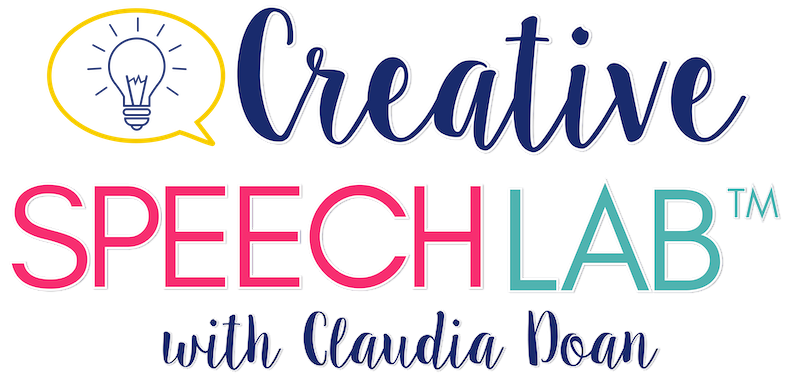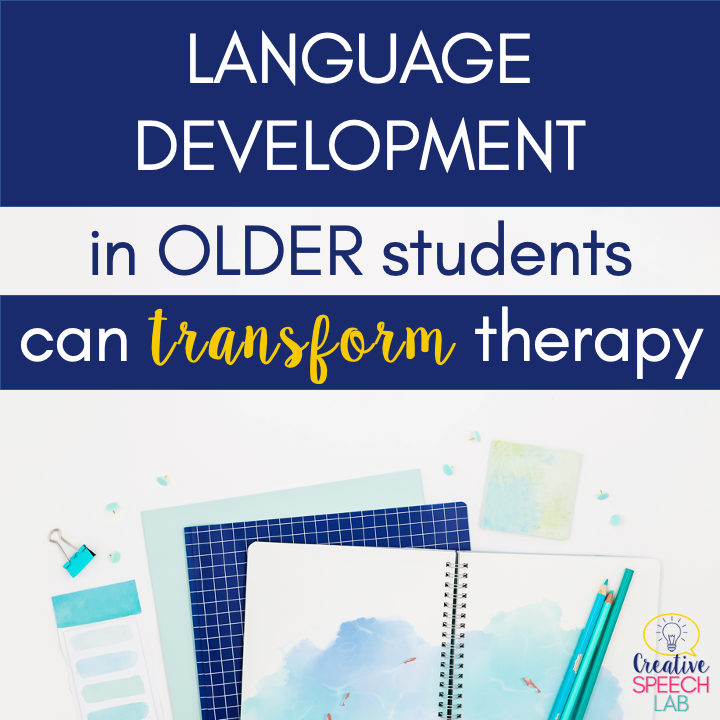When you think about child language development, do younger or older children come to mind?
My guess is that you think about those early years of development, (which makes sense!) After all, there are so many rapid and profound developmental changes at this stage of life.
Today I’m here to talk 5 important developmental milestones and insightful facts to consider as you plan therapy for your OLDER students!
(Honestly, it was difficult to narrow it down to just 5 areas!)
1. LINGUISTIC INDIVIDUALISM
During adolescence, when children begin to become more independent and learn about themselves as individuals, they develop linguistic individualism.
At this stage of their language development, they are more likely to excel with learning materials that reflect their personal interests and areas they would like to learn more about (Nippold, 2016).
THERAPY TAKEAWAY:
When possible, use learning materials related to topics your students care about or high-interest topics that most older children like to learn about. When developing stimulus word lists for practice, select words they encounter in their personal lives.
2. READING TO LEARN
According to Nippold (2016), there is a shift in how children learn and develop language skills with age. Younger children rely predominantly on spoken communication for language input, whereas older children further develop their language through reading.
THERAPY TAKEAWAY:
Be sure to incorporate reading passages and books during your language therapy.
3. DISCOURSE GENRES
As you work on verbal and written expression with your older students, the genre you select (e.g. narrative, conversational, persuasive) can have an impact on their grown and performance.
Here are a few interesting facts from the research:
-
Crowhurst and Piche (1979) found that the persuasive genre (e.g. debating a controversial topic) generated a greater MLU in older students than narrative and descriptive genres.
-
Crowhurst (1980) found a significant amount of growth through each grade level in the persuasive genre (whereas in the narrative genre, no growth was noted after grade 10).
-
Nippold, Frantz-Kaspar, et al. (2014) found that the MLU and syntactic complexity among 5-13 year-old children were greater during narrative vs. conversational tasks. This was attributed to the complex thinking involved in the narrative tasks presented.
- With regard to written expression, researchers have found the persuasive genre to be the most challenging because it requires students to consider alternate perspectives regarding controversial topics and utilize “advanced levels of syntactic, semantic and pragmatic development” (Nippold, 2016).
THERAPY TAKEAWAY:
Teach your students about genres so that they can differentiate between them when speaking and writing.
Given the above research, work on the persuasive genre through high-interest debate topics and choose narrative tasks as opposed to conversational ones when possible.
4. METALINGUISTIC COMPETENCE
One of my favorite things about working with older students is their ability to reflect on their understanding of language through their development of metalinguistic competence. This provides an incredibly powerful teaching tool and has the potential to assist with generalization.
THERAPY TAKEAWAY:
Engage your students in reflection about learning strategies, self-advocacy and generalization with educational and structured discussions and tools. Develop functional stimulus word lists and generalization ideas together with targeted graphic organizers.
5. COGNITIVE-LINGUISTIC SKILLS
Researchers have found that there is a “second developmental window” for learning during adolescence due to increased neuroplasticity in the prefrontal cortex of the brain (Fahy et al, 2021). This area of the brain is responsible for executive functioning skills (e.g. planning, working memory, organizing), which are essential to learning.
This is particularly valuable to be aware of because, according to Fahy and Browning (2021), older children with a history of developmental language disorder tend to showcase executive functioning challenges as they grow older and encounter more demanding academic tasks in the upper grades.
TAKEAWAY: As you work on language goals with your students, simultaneously incorporate executive functioning strategies. Model the use of support tools such as printable sticky notes. (Learn more about executive functioning and the second developmental window in these Older Student Handouts).
I hope this post provides insight and highlights important ways YOU can use your knowledge about older student language development to inform your treatment planning!
LEARN ALL OF MY BEST INFORMATION ABOUT EFFECTIVELY HELPING YOUR OLDER STUDENTS WHILE EARNING ASHA CEU’S WITH MY ONLINE COURSE THROUGH NORTHERN SPEECH SERVICES!
REFERENCES
Crowhurst, M., & Piche, G.L. (1979). Audience and mode of discourse effects on syntactic complexity in writing at two grade levels. Research in the Teaching of English, 13, 101-109.
Crowhurst, M. (1980). Syntactic complexity in narration and argument at three grade levels. Canadian Journal of Education. 5, 6-13.
Fahy, J. K., & Browning, D. K. (2021). Adolescent language therapy: Syntax and semantics for reasoning and planning. Perspectives of the ASHA Special Interest Groups, 6(6), 1327–1342. https://doi.org/10.1044/2021_persp-21-00017
Nippold, M.A., Frantz-Kaspar, M.W., Cramond, P., Kirk, C., Hayward-Mayhew, C. & MacKinnon, M. (2014). Conversation and Narrative Speaking in Adolescents: Examining the use of complex syntax. Journal of Speech, Language, and Hearing Research, 57, 876-886.
Nippold, M. A. (2016). In Later language development: School-age children, adolescents, and young adults: fourth edition (pp. 268-280)., PRO-ED, an international publisher.



